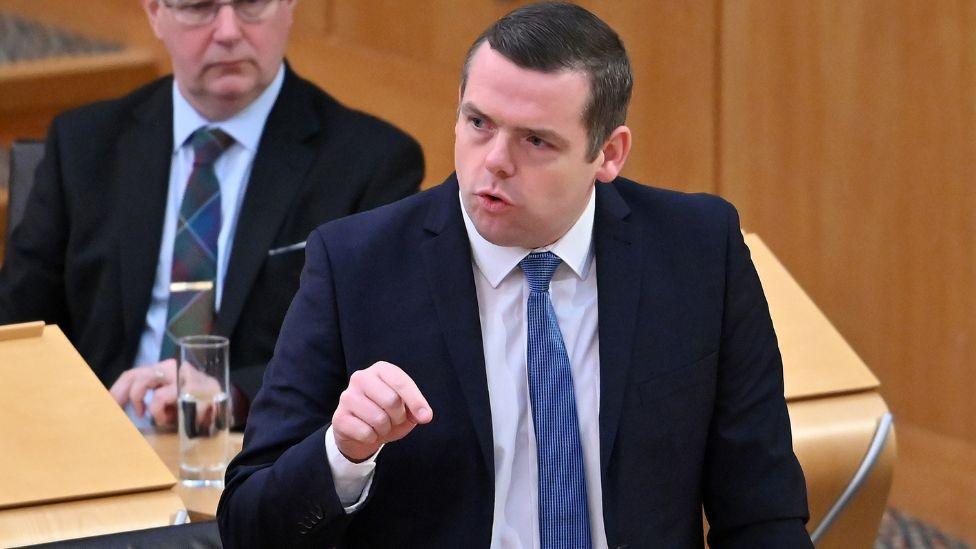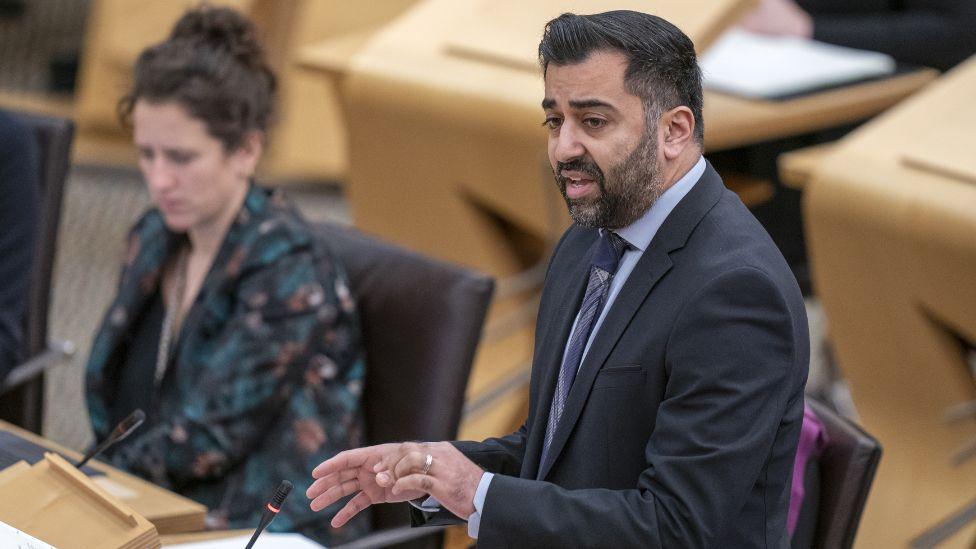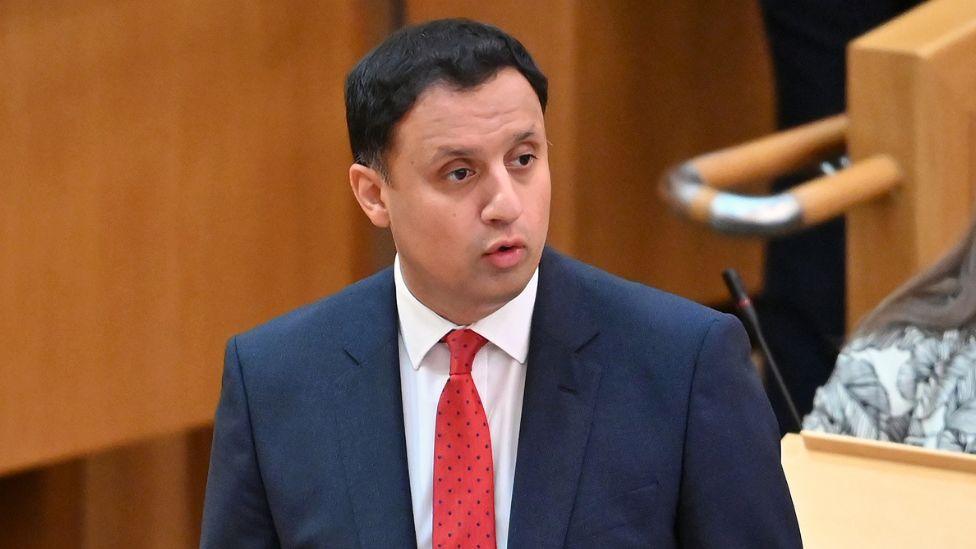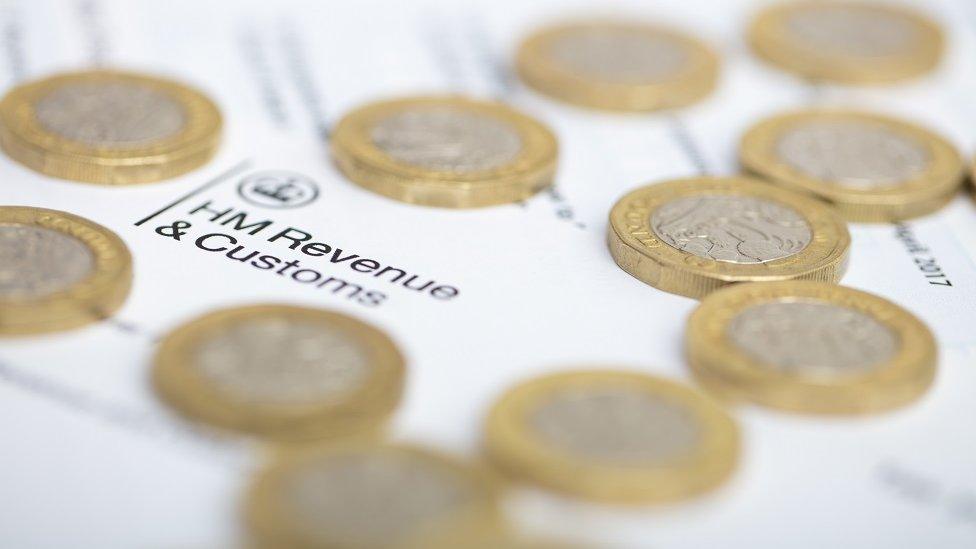Scots 'pay more for less' after budget, Douglas Ross says
- Published

Scottish Tory leader Douglas Ross says Scottish businesses are being put at a "competitive disadvantage"
Scots are "paying more and getting less" due to tax rises in the government's budget, Scottish Tory leader Douglas Ross has said.
He accused ministers of wasting taxpayers' money and warned highly-skilled workers could move away from Scotland.
It came as council leaders said the budget would lead to service cuts and job losses across the country.
First Minister Humza Yousaf defended the "progressive" taxation policy.
He said the government had prioritised real-terms funding increases for the NHS and other key services.
Under the budget, a new 45% band will be introduced for people earning between £75,000 and £125,140.
The top rate of tax on earnings above £125,000 will also rise from 47% to 48%, while the current threshold for paying the higher band - £43,663 - will be frozen instead of rising by inflation.
At First Minister's Questions, Mr Ross said those earning more than £28,850 in Scotland will have to pay more in tax than people south of the border, meaning more than 1.5m Scots will pay higher rates than UK counterparts.
The Scottish Fiscal Commission said, external this week anyone earning more than £28,850 - slightly above median earnings - will pay more in income tax but that it was unclear if the majority of people in Scotland face higher taxes when other levies are taken into account.
"At its heart this was a budget from the SNP that was about Scots paying more and getting less," the Scottish Tory leader said.
He cited concerns from Iain Kennedy, chairman of BMA Scotland, that the new advanced tax band could push senior health staff out of the NHS or to cut overtime.

First Minister Humza Yousaf defended the new tax policy
Mr Ross criticised the first minister for not replicating a 75% discount in non-domestic rates for businesses occupying eligible retail, hospitality and leisure properties for shops, pubs and hotels in Scotland.
The Scottish government instead announced a freeze on premises valued at less than £51,000 and 100% relief for hospitality businesses on Scotland's islands.
Mr Ross said Scottish businesses were being put at a "competitive disadvantage", adding: "Tight budgets are purely the SNP's fault for wasting taxpayers' money."
Mr Yousaf said the majority of taxpayers in Scotland pay less tax than they would in other parts of the UK.
He said the UK government had prioritised tax cuts for higher earners in its Autumn Statement, whereas the top 5% of earners in Scotland were being asked to pay more.
The first minister said this would fund a more than £500m uplift for the NHS, as well as improved funding for education, police and the fire service.
'Tory tax cuts'
He told MSPs there was no evidence of a "mass exodus" from Scotland when taxes are raised. He cited NRS statistics, external from 2022 that found 56,200 people came to Scotland from the rest of the UK, while 47,300 left Scotland for other parts of the UK - a net gain of 8,900.
Mr Yousaf said cutting business rates would have led to real-terms cuts to the NHS and other key services.
"While we ask the top 5% to pay a little more in tax, they get more from it," he added.
Scottish Labour leader Anas Sarwar also said taxpayers would "pay more and get less" as a result of the budget.
He said the "so-called progressive" tax rise would raise £82m, which would "buy you a fifth of an SNP ferry that hasn't even sailed yet".

Scottish Labour leader Anas Sarwar was also critical of the budget
Addressing the first minister, Mr Sarwar said: "He thinks if you earn almost £29,000 you should pay more tax in Scotland than in the rest of the UK.
"These are not the people with the broadest shoulders but they are being forced to pay the price for his failures in the middle of a cost of living crisis."
He also condemned cuts to affordable housing, mental health fuel insecurity programmes.
Mr Yousaf likened the Scottish Labour leader to a "broken record" and said he opposed "every single revenue-raising power and policy that we bring to this parliament".
He pointed out Anas Sarwar backed a 50p rate on earnings of £100,000 and more during his leadership bid.
Councils are 'breaking point'
The government said it would provide record funding of almost £13.9bn to local authorities, with Deputy First Minister Shona Robison calling it a "fair settlement".
However, council umbrella body Cosla said local authorities would need another £250m in revenue funding and £99.5m in capital funding to "stand still".
It also said the government had failed in its pledge to provide all the funds needed to cover a nationwide council tax freeze.
Cosla president Shona Morrison warned council services would be left at "breaking point, with some having to stop altogether".
"The budget in its current form could result in service cuts, job losses and an inevitable shift to providing statutory services only," she said following a meeting of council leaders.
"This means potentially losing libraries, leisure centres and all the things that improve our lives."

Why is there a council tax row?
Local authorities are in charge of setting council tax rates, but they can be convinced to cancel hikes if they are given financial assurances by the Scottish government.
This was the case between 2008-09 and 2016-17, as well as in 2021-22. Council tax increases were also capped at about 3% in 2017-18 and 2018-19.
Local authorities are able to set the level of council tax by deciding on the middle band D rate, which is used as an anchor figure from which other bands are proportionally affected.
The Scottish government has control over what are called the "multipliers" - the ratio between band D and the other rates. It had consulted on changing the multipliers by as much as 22.5% on higher band properties.
Cosla said it would need about £300m to make up for a freeze on council tax and multipliers after First Minister Humza Yousaf unexpectedly announced a nationwide council tax freeze in October.
Yet in its budget the government pledged to provide £144m to fund an equivalent 5% rise in council tax.
There were no funds to cover a change in the multipliers for higher bands, which Deputy First Minister Shona Robison said would cost about £188m.
Local authorities are not compelled to accept the freeze fund and Cosla reiterated following Thursday's meeting that it was "for each individual council to determine their own level of council tax".
Ms Robison told BBC Scotland's Podlitical podcast: "I am not going to force anyone to take the council tax freeze money - it's on the table, it's an offer to try to help household budgets at a tough time."
- Published19 December 2023
